Mosquito Borne Diseases (EEE and West Nile Virus)
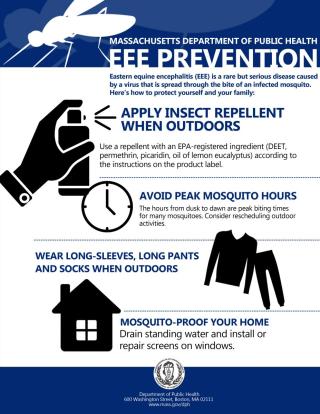
EEE/WNV Season Updates (Last updated 9/27/2021)
Five different trapping sites in Uxbridge have collected mosquitoes which are positive for West Nile virus. Each positive sample has come from a different trapping site in various parts of town. Therefore, WNV can be assumed to be in Uxbridge in general. This is not surprising news, given the time of year and the rainy summer we have had. There have been no reports of the EEE virus so far. Our weekly reporting can be found in the attachment below.
What does this mean for you? If you have not been doing so already, you need to begin to exercise precautions against mosquito bites in general. After the recent rain, there may be standing water in tires, flower pots, or other items. Please empty them so mosquitoes don’t breed on your property. For more information about personal protection and WNV visit Mosquito Borne Diseases (EEE and West Nile Virus) | Uxbridge, MA (uxbridge-ma.gov)
Our local surveillance is being done by VectorScape as part of a Municipal Vulnerability Preparedness grant. They will continue to trap and test mosquito pools throughout the season, which can extend into October. The state Department of Public Health currently lists Uxbridge in the Low Risk category. This supplemental information provided by VectorScape simply means the risk category may be higher. See DPH risk map: Massachusetts Arbovirus Update | Mass.gov
Please start protecting yourself against mosquito bites now! Click here to view the latest Massachusetts arbovirus Risk Map to see areas at critical, high, and moderate risk. Information about current mosquito activity in Massachusetts is updated daily and can be found here.
If you suspect your horses or any of your other animals have EEE, you must report it to the Department of Agricultural Resources and the Department of Public Health
- You can report the suspected case to DAR by calling 617-626-1795
- You can report the suspected case to DPH by calling 617-983-6800
Mosquito Borne Diseases in Massachusetts
Mosquito Borne Diseases, also known as arboviruses, are diseases spread to humans by the bite of an infected mosquito1. When a mosquito bites a human, the pathogen is released into the bloodstream of the human, where it can cause illness.
In Massachusetts, two mosquito borne diseases exist: West Nile Virus and Eastern Equine Encephalitis, also known as EEE2.
General Information About Massachusetts Mosquitoes
There are 51 kinds of mosquitoes in Massachusetts. Eight of those are known to spread disease. Most mosquitoes do not bite humans. In fact, the mosquitoes that carry EEE, Culiseta melanura, almost never bite humans. They prefer to bite birds instead3. They only bite humans when there are no nearby animals. In Massachusetts, most types of mosquitoes that carry viruses are most active between sunset and sunrise4.
Mosquito Life Cycle
The mosquito life cycle is short, usually around 14 days4. The life cycle has four distinct phases: egg, larva, pupa and adult. The first three phases must take place in standing water, and mosquitoes can grow into adults within 7-8 days after a female lays her eggs.
Amazingly, female mosquitoes lay between 100-300 eggs at a time in standing water. They are drawn to ponds, watering cans, troughs, gutters, puddles, ditches and marshes, and even children’s toys. During mosquito season, most eggs hatch into larvae within 48 hours of being laid5.
The larva phase for 5 to 8 days before progressing to the pupa phase. After 1-2 days, the mosquitoes emerge from the water as adults.
Adult mosquitoes do not live very long: most female mosquitoes live for less than two weeks, and most males live for less than a week5.
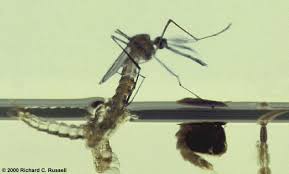
Preventing Mosquito Borne Diseases
You can protect yourself against mosquito borne diseases. The best way to protect yourself against EEE and West Nile Virus is to not be bitten in the first place! We recommend that you:
- Use DEET, permethrin, picaridin, or oil of lemon eucalyptus-based insect repellants (bug spray) whenever you go outdoors, including working in your yard or sitting on your porch or patio. You can use the EPA tool to find out which repellant is best for you here
- Wear long sleeved clothing and pants when you are outside
- The mosquitoes that carry EEE and West Nile Virus are most active at night, so avoid doing outdoor any outdoor activities from sunset to sunrise during peak mosquito season (from June to early October)
- Fix any damage to window and door screens
- Remove standing water from around your home to prevent mosquitoes from breeding
- Reduce places near your home where water can gather:
- Cover swimming pools when you’re not using them
- Empty out water barrels, water troughs, buckets, watering cans, bird baths, flowerpot saucers and trash cans at least once a week
- Turn over wheelbarrows when you aren’t using them
- Recycle old tires
- Clean out your gutters to make sure water can drain

Mosquito Borne Diseases in Animals
If you suspect your horses or any of your other animals have EEE, you must report it to the Department of Agricultural Resources and the Department of Public Health
- You can report the suspected case to DAR by calling 617-626-1795
- You can report the suspected case to DPH by calling 617-983-6800
Eastern Equine Encephalitis (EEE)
This is an overview of EEE, for more detailed information and resources, click here
Eastern Equine Encephalitis is a very rare and extremely dangerous disease transmitted by mosquitoes. In the wild, EEE cycles between birds and Cs. melanura mosquitoes7, and can infect humans when mosquitoes infected with EEE bite humans. In some areas where melanura mosquitoes are very common, human-biting mosquitoes may get infected with EEE as well, then spread the virus to humans.
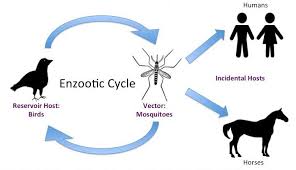
EEE is only spread from bird to mosquito to human. Humans cannot give EEE to other people, and a mosquito who bites an infected human will not become infected with EEE9.
Infection with the EEE virus can result in fever, meningitis (infection of areas around the brain and the nerves near the spine) or encephalitis (the infection of the brain). EEE is very dangerous: As many as 75% of people who get EEE die, and 30% of survivors will have long term brain and nerve damage9.
In 2019, Massachusetts had 12 human cases of EEE and 3 human cases of West Nile Virus (WNV). In August 2019, Uxbridge was designated as a critical risk community. Outbreaks of EEE typically last two to three years, so it is important to take proper precautions this year.
When Do Symptoms Start?
Symptoms usually start 4 to 10 days after the infecting bite. After symptoms begin, they usually last one to two weeks, though recovery often takes much longer9.
EEE Symptoms
The seriousness of EEE depends on whether or not the virus enters the brain or the central nervous system (CNS). If EEE virus does not enter the nerve cells, the illness will probably be mild. Symptoms usually include fever, chills, malaise (generally feeling sick), joint pain and muscle aches.
If the virus does enter the nerve cells or the brain, the EEE illness is extremely dangerous. The first symptoms may be sudden fever, chills, headache, and vomiting. Symptoms may then become diarrhea, seizures, sleepiness and coma, and may lead to death9.
When to Seek Medical Attention:
If you or someone you know has sudden high fever, chills, headache or vomiting, contact a healthcare provider IMMEDIATELY.
West Nile Virus
This is an overview of EEE, for more detailed information and resources, click here.
West Nile Virus is a mosquito borne disease that is usually only seen in animals but may also infect humans. In the wild, West Nile Virus cycles between birds and mosquitoes.
Rarely, a mosquito with West Nile Virus will bite a human and infect them. In most cases, WNV is transmitted to humans by the Culex mosquito species, particularly Culex pipiens10.
WNV needs a mosquito bite to infect a person: it can’t spread directly from animals to people or from person to person11. People over 50 years old are at higher risk for complications of WNV.

When Do Symptoms Start?
Symptoms usually start 4 to 10 days after the infecting bite9.
West Nile Virus Symptoms
About 80% of people who are infected with West Nile Virus will not have any symptoms.
1 out of every 5 of people who are infected with West Nile Virus may experience fever, nausea, body aches, headaches, swollen lymph glands, and a skin rash on their chest, stomach and back. Feelings of extreme tiredness and weakness are known to last for several weeks after recovering12.
Very rarely, in less than 1% of those who get WNV, the infection may spread to the Central Nervous System (the nerves around the spine) and cause encephalitis (brain infection) or meningitis (nerve infection). When this happens, symptoms may include headache, high fever, stiff neck, stupor, disorientation, tremors, convulsions, muscle weakness, loss of sight and paralysis.
When to Seek Medical Attention
If you or someone you know has any severe symptoms such as sudden fever, skin rash on their chest, stomach, and back, swollen lymph glands, or severe nausea, contact a healthcare provider.
What to Do If You Are Bitten by a Mosquito
Most mosquitoes do not spread infectious disease, and the worst you will experience from a mosquito bite is swelling and itching. It is important to keep an eye on your mosquito bites for infection and be alert for any symptoms of EEE or West Nile Virus for several days after being bitten.
Get medical attention if you experience a serious allergic reaction or any symptoms of West Nile Virus or EEE.
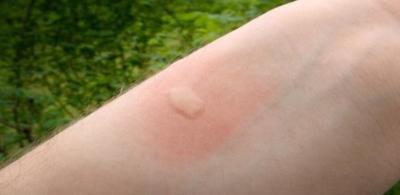
At Home Treatment for Mosquito Bites:
To reduce swelling and itching from mosquito bites, CDC recommends three different options13:
- To reduce swelling, and itching, wash the skin close to the bite area with soap and water, then put an ice pack on it for 10 minutes.
- To reduce itching, clean the bite with soap and water, then make a mixture of 1 tablespoon baking soda and just enough water to make a paste. Put that paste on the bite for 10 minutes, then wash it off.
- You can also use an over-the-counter antihistamine cream to relieve itching. Make sure to follow the directions on the product’s label.
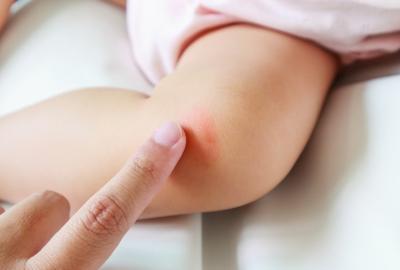
For more information about mosquito bites and treatment, you can visit the CDC’s website at https://www.cdc.gov/mosquitoes/mosquito-bites/symptoms.html
Mosquito Control in Uxbridge
Uxbridge is not part of a Mosquito Control Project (MCP). At Fall Town Meeting in 2019, an article to join the Central Massachusetts Mosquito Control Project (CMMCP) did not pass. So, no town-wide larvicide or adulticide applications are scheduled.
After the 2019 EEE outbreak, the town of Uxbridge applied and received a Municipal Vulnerability Preparedness grant from the state. Using the money from that grant, we are working to assess possible mosquito habitats (such as vernal pools and wetlands), planning improvements to dams and culverts to reduce mosquito breeding sites and holding a conference with local towns to improve our collaboration on mosquito control.
VectorScape, LLC was awarded the contract for Mosquito Surveillance, Control and Consulting on Public Education for the Town of Uxbridge in June, 2021. Testing is being conducted on a weekly basis and results will be shared with the community.
The Massachusetts Department of Public Health also conducts regular surveillance EEE and WNV in mosquitoes across the state.
For more information on the MVP grants, click here. For more information about the DPH Mosquito Surveillance Program, click here.
To see the DPH Arbovirus Surveillance plan, click here.
Helpful Links
If you have questions about mosquito borne diseases, you can call the Board of Health at (508) 278-8600 Ext. 8.
You can find further information about mosquitoes in Massachusetts at this link: https://www.mass.gov/info-details/mosquitoes-in-massachusetts
For information about mosquito-borne disease in MA, click here
To see all positive EEE and West Nile Virus Test results, click here
For information on EEE, you can visit the Uxbridge, MA Department of Public Health and Centers for Disease Control websites:
- Uxbridge Board of Health: https://www.uxbridge-ma.gov/board-health/pages/eastern-equine-encephalitis-eee
- MA Department of Public Health: https://www.mass.gov/service-details/eee-eastern-equine-encephalitis
- CDC: https://www.cdc.gov/easternequineencephalitis/index.html?CDC_AA_refVal=https%3A%2F%2Fwww.cdc.gov%2Feasternequineencephalitis%2Ftech%2Ffactsheet.html
For information about West Nile Virus, you can visit the MA Department of Public Health, Uxbridge, Centers for Disease Control, and World Health Organization websites
- Uxbridge: https://www.uxbridge-ma.gov/board-health/pages/west-nile-virus
- MA Department of Public Health: https://www.mass.gov/service-details/west-nile-virus-wnv
- Centers for Disease Control: https://www.cdc.gov/features/westnilevirus/index.html
- WHO: https://www.who.int/news-room/fact-sheets/detail/west-nile-virus
If you have medical concerns about EEE or WNV, or you have symptoms, here is a list of providers in and around Uxbridge:
- TriRiver Family Health Center: https://www.umassmemorialhealthcare.org/umass-memorial-medical-center/locations/tri-river-family-health-center
- Milford Hospital https://www.milfordregional.org/
- UMass Memorial Hospital, Worcester https://www.umassmemorialhealthcare.org/
- Tri-County Internal Medicine https://www.milfordregionalphysicians.org/practices/tri-county-urgent-care-milford
You can see the 2020 Massachusetts Arbovirus Surveillance Plan here: https://www.mass.gov/lists/arbovirus-surveillance-plan-and-historical-data
Citations:
- Mosquito-Borne Diseases | NIOSH | CDC. https://www.cdc.gov/niosh/topics/outdoor/mosquito-borne/default.html. Accessed June 18, 2020.
- Mosquito-borne Diseases | Mass.gov. https://www.mass.gov/mosquito-borne-diseases. Accessed June 18, 2020.
- Transmission | Eastern Equine Encephalitis | CDC. https://www.cdc.gov/easternequineencephalitis/tech/transmission.html. Accessed June 18, 2020.
- Mosquitoes in Massachusetts | Mass.gov. https://www.mass.gov/info-details/mosquitoes-in-massachusetts. Accessed June 18, 2020.
- Mosquito Life Cycle Aedes Aegypti. www.cdc.gov/dengue. Accessed June 18, 2020.
- Kauffman E, Payne A, Franke M, Schmid M, Harris E, Kramer L. Rearing of Culex spp. and Aedes spp. Mosquitoes. BIO-PROTOCOL. 2017;7(17). doi:10.21769/bioprotoc.2542
- Mermel LA. Association of Human Eastern Equine Encephalitis With Precipitation Levels in Massachusetts. JAMA Netw open. 2020;3(1):e1920261. doi:10.1001/jamanetworkopen.2019.20261
- Transmission | Eastern Equine Encephalitis | CDC. https://www.cdc.gov/easternequineencephalitis/tech/transmission.html. Accessed June 18, 2020.
- Symptoms & Treatment | Eastern Equine Encephalitis | CDC. https://www.cdc.gov/easternequineencephalitis/tech/symptoms.html. Accessed June 18, 2020.
- West Nile virus. https://www.who.int/news-room/fact-sheets/detail/west-nile-virus. Accessed June 18, 2020.
- West Nile Virus (WNV) | Mass.gov. https://www.mass.gov/service-details/west-nile-virus-wnv. Accessed June 18, 2020.
- West Nile Virus | Features | CDC. https://www.cdc.gov/features/westnilevirus/index.html. Accessed June 18, 2020.
- Mosquito Bite Symptoms and Treatment | Mosquitoes | CDC. https://www.cdc.gov/mosquitoes/mosquito-bites/symptoms.html. Accessed June 18, 2020.
| Attachment | Size |
|---|---|
| 872.12 KB | |
| 53.32 KB |
